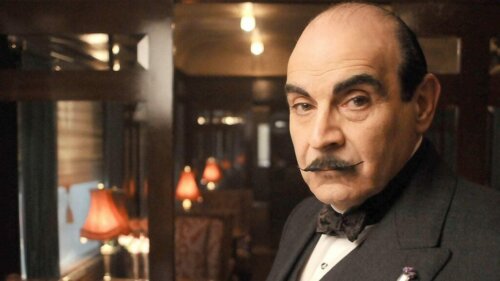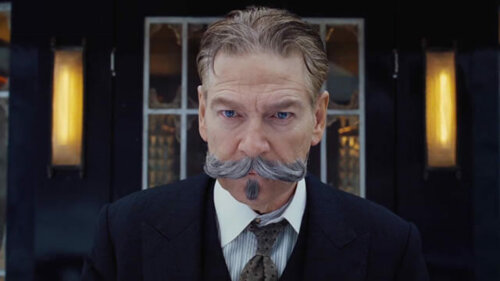Hercules Poirot and His Little Grey Cells


Written and verified by the psychologist Sergio De Dios González
When people think of detective stories, the first thing to come to mind is usually British detective novels from the early 20th century. Their protagonists, eccentric characters such as Sherlock Holmes or Hercules Poirot, are famous all over the world. Today, we’ll talk about the latter, Agatha Christie’s odd little Belgian detective.
Agatha Christie’s fame
Agatha Christie was the author who brought this unique character to life. Hercules Poirot made his first appearance in the novel The Mysterious Affair at Styles (1920). From that moment on, he became one of the most oft-recurring characters in literature. He’s the protagonist of 33 novels and 50 short stories.
The Queen of Crime had a love-hate relationship with her character. Of Poirot, Christie wrote, “Why? Why did I ever invent this detestable, bombastic, tiresome little creature? … Eternally straightening things, eternally boasting, eternally twirling his mustaches and tilting his egg-shaped head… I point out that by a few strokes of the pen… I could destroy him utterly. He replies, grandiloquently: ‘Impossible to get rid of Poirot like that! He is much too clever”. Nevertheless, Christie went on to say that Hercules Poirot won and that she felt a certain affection for him in spite of herself.
Agatha Christie’s fame
Agatha Christie’s fame grew like wildfire, and so did the fame of her characters, such as Poirot and Miss Marple. Critics have lauded her books as some of the best in their genre. They’ve also been translated into more than 100 languages. Christie is the most translated author in the world. In terms of sales, Agatha Christie is just a step down from authors such as Shakespeare and books such as the Bible or Don Quixote.
While Christie enjoys the adoration of the public, critics haven’t always agreed with the popular opinion. Many believe that her novels shouldn’t be cataloged as literature, but rather subliterature or para literature. In other words, literature for the masses. Whatever your feelings on that particular subject, Christie’s fame is indisputable, and her character, Hercules Poirot, is a big part of the reason for her success.
“The truth, it has a habit of revealing itself.”
-Hercules Poirot-
Discovering Hercules Poirot
Conan Doyle, the creator of Sherlock Holmes, was one of Christie’s favorite authors. In her first novels, it’s evident that she’s emulating Doyle and E.A. Poe. Over time, however, Christie’s main character gets his own identity. Christie takes off on her own path and leaves her role models behind.
It wouldn’t be fair to compare Poirot to other mystery detectives. Nor should we try to simply write him off as another Sherlock Holmes. On the contrary, Poirot deserves his own analysis. He’s an easily recognizable character due to his distinctive features. He’s an exceptional and peculiar detective, equally irritating and adorable.

A lovable eccentric
You could describe Poirot as a vain perfectionist. He’s methodical, extremely organized, a lover of squares and symmetry, and with an obsessive, almost pedantic manner. Poirot is also very, very Belgian. Agatha Christie gave her character the same nationality as Tintin as a result of her work with Belgian refugees during World War I.
Poirot’s perfectionism is evident in his physical appearance. Christie describes him as short and plump with an odd, pointy mustache. His mustache is comically perfect and well-cared for. Everything he is and does is perfectly calculated. A speck of dust on his clothes would make him out of sorts. Nothing bothers Poirot more than a slightly crooked picture on the wall.
An endless amount of eccentricities and extravagancies lead Poirot into comical situations that provide a nice contrast to the tragic and macabre nature of his work. The idea that Poirot is laughable breaks with the goofy, comic relief kind of characters often found in literature (such as Sancho Panza). Poirot is an extremely intelligent detective, able to unmask the most atrocious killers through simple observation and the help of his “little grey cells”. Nothing escapes Poirot, a detective who understands the subtleties of criminal psychology.
Poirot and crime
His obsession for perfection leads Poirot to look for it in every situation, including the crime scene. Christie’s books all follow the same structure: character introduction, crime, investigation, and resolution. Her characters tend to be upper class, the settings fairly limited, and passion or money usually the primary motivation. Poirot solves the crimes without ever getting dirty. He observes and interrogates calmly, using psychology and reason.
Poirot gets into the minds of criminals, connects with the reader, and with psychology. Agatha Christie sets out a game for her reader. She leaves us the pieces of the puzzle throughout the book and the reader, like Poirot, has to organize them for things to make sense. Combining what sells with what readers like is the secret to Christie’s success with the public, but not always with the critics.
Hercules Poirot in film
These kinds of stories, with their simple structure and attractive subjects, tend to be perfect for the big screen. As a result, it’s no surprise that numerous actors have sported the Belgian detective’s iconic pointy mustache. Adapting an Agatha Christie novel to film is generally a recipe for success at the box office. The formula can be a double-edged sword, however. Either the movie is a huge hit or a complete failure.
Why would a movie about such a well-known and loved character fail? In this case, the reason it could be successful is the same reason it might fail. People know the character well and recognize him. If the on-screen Poirot is too different from what you read in the book, you’ll feel betrayed. This is what happened to poor Kenneth Branagh in the 2017 film adaptation of Murder on the Orient Express. If you haven’t read the book, the movie has its charms. If you know the character, however, Branagh’s interpretation of Poirot leaves a lot to be desired.

The unsuccessful reinterpretation of a beloved character
The movie has too much action and takes too many artistic liberties with the plot. Poirot himself is overly agile, too skinny, and not very believable. Poirot would never have resorted to violence, never ended up in situations with so much action. He’s a methodical, peaceful, measured man, much like the plot of Christie’s novels. The events of Murder on the Orient Express take place in a small, claustrophobic place, without much action, and with a lot of dialogue.
The key to Christie’s novels is progressive and deductive discovery. Her characters move through small, well-decorated, luxurious spaces. This pace and style aren’t particularly attractive to 21st-century moviegoers, which is one reason why Branagh’s film was a flop. At the same time, the 1974 version of Murder on the Orient Express may have overshadowed it. Poirot was very successfully played by Albert Finney, though he may have been a bit stiff-necked about it.
Perhaps the passage of time hasn’t been kind to the detective, which is why we prefer the acting of Peter Ustinov and David Suchet, who have played Poirot on TV for years. Retelling stories is fine, but not always a great idea when you’re dealing with such unique characters. Sometimes, it’s better to keep a good memory than to try and reinvent the wheel.
The death of Hercules Poirot
Christie always wanted to get rid of the insufferable and lovable Poirot, the character that catapulted her to success. So she wrote Curtain, to “murder” the famous detective. She stored the novel in a drawer for years until the right moment came to put Poirot’s little grey cells to rest forever. He was such a popular character and his death made such an impact on readers that The New York Times published an obituary for him. It’s the only obituary they’ve ever published about a fictional character.
“In the little grey cells of the brain lies the solution to every mystery.”
-Hercules Poirot-
This text is provided for informational purposes only and does not replace consultation with a professional. If in doubt, consult your specialist.








